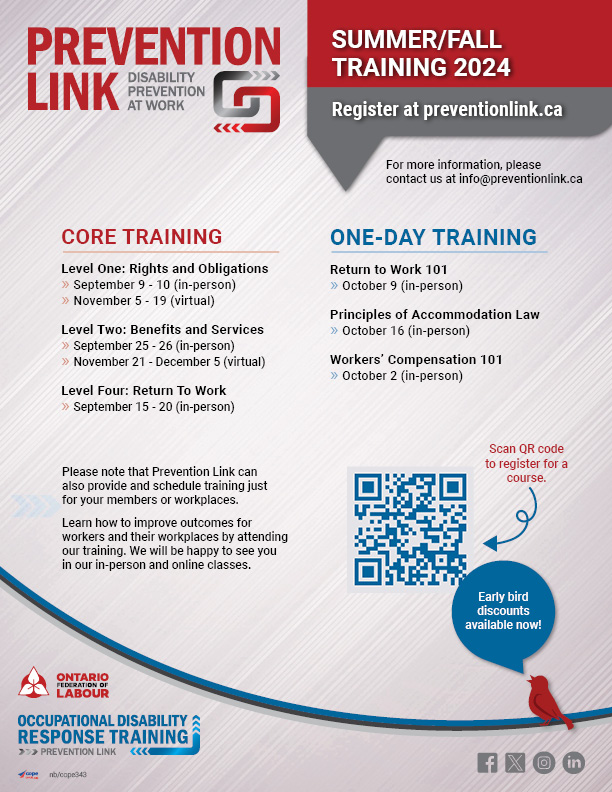Building on over 30 years of success, the Prevention Link Program is one of Ontario’s only comprehensive prevention programs. Prevention Link is relying on the experience and success of a network of workplace-based occupational disability prevention champions to enhance primary and secondary prevention of workplace injury and illness and prevent re-injury after return to work. Learn how to improve outcomes for workers and their workplaces by attending our training.
Who should attend: WSIB representatives, Workers’ Compensation activists, RTW specialists, union leadership and union stewards, H&S representatives and activists, supervisors, human resources specialists, employers and young workers. We will be happy to see you in our in-person and online classes.
Please note that Prevention Link can also provide and schedule training just for your members or workplaces!
CORE CURRICULUM
LEVEL 1: RIGHTS AND OBLIGATIONS
Duration: 12 hours. Prerequisites: None.
» September 9 – September 10 (in-person)
» November 5 – November 19 (virtual)
The first of six core certification courses offered within Prevention Link’s disability prevention curriculum. This introductory course begins by exploring the history of Ontario’s compensation system and the development of legislation and the general principles of the system.
Participants learn the basics of a disability prevention framework, including:
- Types of workplace injuries and occupational illnesses;
- The legal tests applied by the Workplace Safety and Insurance Board (WSIB) when considering entitlement;
- The method to report an injury;
- The steps to initiate a claim;
- Reporting strategies, including time limits and potential penalties.
Cost: $449.00. Register early to get a $40.00 discount!
LEVEL 2: BENEFITS AND SERVICES
Duration: 12 hours. Prerequisites: Level 1.
» September 25 – September 26 (in-person)
» November 21 – December 5 (virtual)
In the second of six core certification courses offered within Prevention Link’s core curriculum, participants will become familiar with the significance of legislation (WSIA), regulations, and policies, including the history of legislative change and Bills that have amended the WSIA.
Participants will:
- Explore changes to the legislation and their effects on benefits and services;
- Discuss the benefits and services available under three district eras;
- Explore benefit calculations including Non-Economic Loss (NEL) and Loss of Earnings (LOE).
Cost: $449.00. Register early to get $40.00 discount!
LEVEL 4: RETURN TO WORK
Prerequisites: Level 1 & Level 2
» September 25 – September 26 (in-person)
TOPICAL WORKSHOPS
WORKERS’ COMPENSATION 101
» October 2 (in-person)
This workshop introduces participants to the compensation system in Ontario, the history and principles of compensation legislation and third party rights of action. Information on the Workplace Safety and Insurance Board (WSIB), including time limits for dealing with issues are discussed and the process flow for claims and appeals are presented.
Participants will learn:
- Injury reporting;
- How claims are filed;
- The responsibilities of the workplace parties;
- The role of medical professionals; and
- Benefits and services available to injured and ill workers.
RETURN TO WORK 101
» October 9 (in-person)
This workshop provides participants with the tools to develop strategies to assist workers with disabilities, individually and collectively; and return them to long term healthy and productive employment. The workshop will review noteworthy case law and Human Rights legislation.
PRINCIPLES OF ACCOMMODATION LAW
» October 16 (in-person)
With a focus on the protected ground of disability and the social area of employment, this workshop will advance a participant’s understanding of human rights legislation and the Duty to Accommodate. The definitions of discrimination will be explored, the requirements for requesting and responding to accommodation needs will be outlined, and what constitutes “undue hardship” will be examined. This workshop provides participants with the resources and tools to develop strategies to assist workers with disabilities, individually and collectively, and support return to long-term healthy and productive employment.
